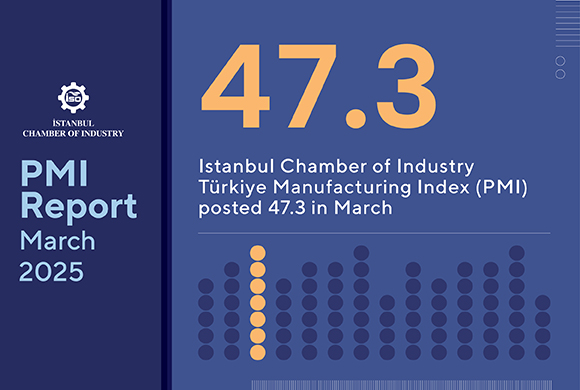News
ICI Released March 2025 ICI Türkiye Manufacturing PMI and Türkiye Sector PMI Report
- 02.04.2025
- News

The ICI Türkiye Manufacturing PMI posted below the 50.0 no-change mark again in March, extending the current sequence of moderating business conditions to one year. At 47.3, the headline PMI was down from 48.3 in February and the lowest since October last year. New orders slowed again in March, the twenty-first consecutive month in which that has been the case. New export orders also eased, and at the fastest pace since November 2022.
According to the Istanbul Chamber of Industry Türkiye Sector PMI March 2025 report, among the 10 sectors monitored under the scope of the survey, the number of those expanding their output increased to four in March. Food products remained the fastest-growing sector. The chemicals, plastics and rubber products sector saw the sharpest output loss. In line with the outlook in output, the number of sectors that increased their staffing numbers rose to four in March. New orders increased only in food products and wood and paper products. The majority of sectors continued to reduce purchasing activity, and weak input demand helped suppliers to speed up deliveries.
The March 2025 period of Istanbul Chamber of Industry (ISO) Türkiye Manufacturing PMI (Purchasing Managers’ Index) survey, which is the fastest and reliable reference accepted in manufacturing industry performance of the economic growth was announced. According to the results of the survey, where any figure greater than 50.0 indicates overall improvement of the sector, the headline PMI posted below the 50.0 no-change mark again in March, extending the current sequence of moderating business conditions to one year. At 47.3, the PMI was down from 48.3 in February and the lowest since October last year.
New orders slowed again in March, the twenty-first consecutive month in which that has been the case. Moreover, the latest moderation was the most pronounced since last October. New export orders also eased, and at the fastest pace since November 2022. Challenging market conditions were said to be behind the latest slowdown in new orders, and also contributed to a scaling back of manufacturing production in March. Output has now moderated on a monthly basis throughout the past year, with the latest softening the sharpest since October 2024. Manufacturers responded to slower new orders by scaling back employment, the fourth month running in which this has been the case. The reduction in staffing levels was only slight, however, and the weakest since December. Purchasing activity also eased in March, while stocks of both inputs and finished products were broadly unchanged. Stability in post-production inventories ended a ten-month sequence of depletion.
A lack of demand for inputs meant that suppliers were able to speed up deliveries. Lead times shortened for the first time in six months, and to the greatest extent since December 2022. Input costs continued to increase sharply in March, largely as a result of currency weakness.
The pace of inflation eased, however, and was at a three-month low. Output prices also rose at a slower rate, and one that was the softest in the year-to-date.
Commenting on the Istanbul Chamber of Industry Türkiye Manufacturing PMI survey data, Andrew Harker, Economics Director at S&P Global Market Intelligence, said:
"Challenging market conditions both at home and abroad meant for further moderations in output and new orders in March as Turkish firms struggled to secure business. There was a lack of pressure on capacity across the sector, with suppliers able to speed up deliveries to the greatest extent since December 2022. Inflationary pressures remained marked, however, as firms had to contend with the ongoing impacts of currency weakness.”
Food sector maintains strong output growth in sector PMI
According to the Istanbul Chamber of Industry Türkiye Sector PMI March 2025 report, among the 10 sectors monitored under the scope of the survey, the number of those expanding their output increased to four in March from two in February. Food products remained the fastest-growing sector with continued strong output growth. Output in wood and paper products, non-metallic mineral products and land and sea vehicles sectors started to increase again. The deterioration in the chemicals, plastics and rubber products sector, which saw the sharpest output loss among sectors, reached the most pronounced level since April 2020.
Despite leading signs that output improved in March, new orders increased only in food products and wood and paper products. The sharpest slowdown in new orders was observed in base metals. The loss of momentum in this sector was the most pronounced since October 2018, excluding the pandemic period. Similarly, new export orders slowed down in eight out of 10 sectors. In line with the outlook in output, the number of sectors that increased their staffing numbers rose to four in March. Land and sea vehicles sector led the employment growth, recording the fastest increase in the staffing numbers since November 2023. The sector with the sharpest decline in the staffing numbers was the base metal industry.
The majority of sectors continued to reduce purchasing activity in March, and weak input demand helped suppliers to speed up deliveries. In fact, suppliers' lead times shortened in eight sectors, excluding electrical and electronic products and clothing and leather goods. The strongest improvement in supplier performance was recorded in the base metals sector. Input costs continued to rise sharply in March, albeit at a slower pace than in February. Input prices rose the fastest in wood and paper products, while they rose the most moderately in clothing and leather products. Finished goods prices decreased in textiles for the first time in three months, but increased in all other sectors.
You can find attached the Istanbul Chamber of Industry Türkiye Manufacturing PMI and Sector PMI March 2025 reports.